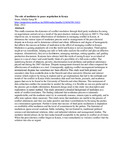| dc.description.abstract | This study examines the dynamics of conflict resolution through third party mediation focusing on negotiations carried out as a result of the post-election violence in Kenya in 2007/8. The study objectives are; to examine effectiveness of mediation in managing conflict in Kenya, to determine the various types of mediation process used in management of the post electoral dispute in in Kenya and to determine cultural and ethnic differences and degree of homogeneity that affects the success or failure of mediation in the effort of managing conflict in Kenya. Mediation is gaining popularity all over the world and Kenya is not an exception. Third parties might act as consultants, helping one side or both sides analyze the conflict and plan an effective response. Alternatively, they act as facilitators, arranging meetings, setting agendas, and guiding productive discussions. Kenyans have always held this myth of seeing Kenya 'as an island of peace in a sea of chaos' and could hardly think of a possibility of a full scale conflict. The underlying factors of ethnicity, poverty, discrimination land problems and political intolerance played out during the 2007 elections. Dispute management research has not often compared the effectiveness of mediation as a tool. Consequently, applying conflict management techniques to international disputes has sometimes not been effective
This study used both primary and secondary data from available data in the Nairobi and other university libraries and internet sources which analyze by trying to explore and to get explanations that led to the outbreak and trends of the conflict in Kenya while secondary data used text books, journals, and academic papers that are to be found in the University of Nairobi and other libraries. This instrument of data collection enables the researcher to eontrol the setting; it is flexible as one can probe and in the process get in-depth information. Research design used in this study was descriptive and exploratory in nature method.
This study presented a detailed background of mediation as a mode of conflict resolution. The finding indicated that mediation process is inherently unpredictable, and the mediator must try to constantly reassess, remain open to ambiguity, and to offer new options when necessary.
This study notes that mediators are useful in the process of conflict abatement, and they can make positive and direct contributions by focusing the parties on a termination agreement. Further it notes that success of third party mediations is dependent on credibility ofthe mediators and the level of commitment by the parties. The literature of mediations spans several academic fields including, but not limited to, traditional political science and international relations, labor and industrial relations and management studies. The mediator should always do his best make himself acceptable to the parties to conflict at all times. When the post-election conflict began in Kenya, it was immediately so violent a conflict that the solution was also as urgent | en_US |

